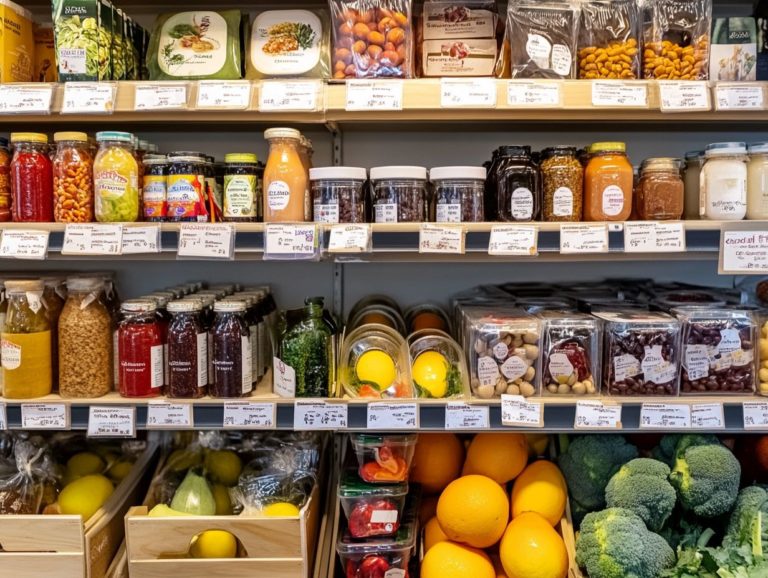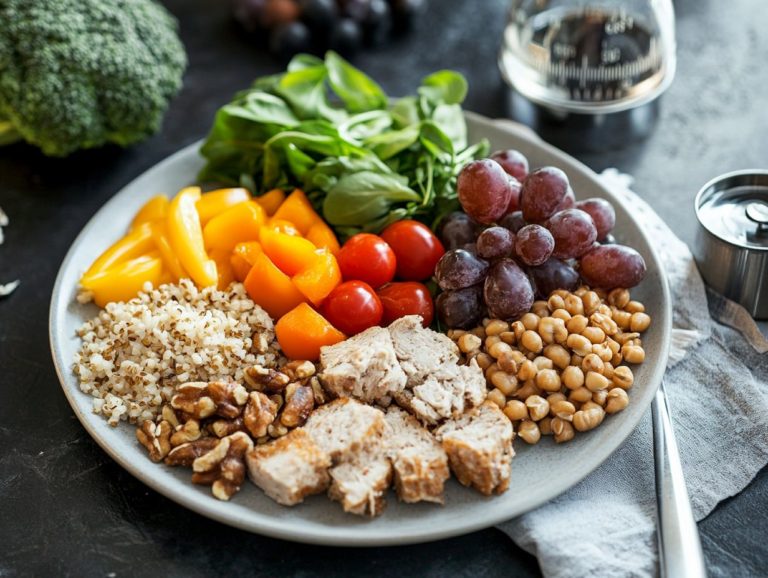The Connection Between Nutrition and Sleep
Nutrition and sleep are deeply intertwined, affecting not only your energy levels but also your overall well-being. Discover how nutrition directly affects your sleep!
This article delves into how your dietary choices can significantly influence the quality of your sleep. It pinpoints specific foods that can either promote or disrupt those peaceful nights.
It discusses essential nutrients that foster better sleep. You ll also explore practical tips for crafting a sleep-friendly diet.
Other factors, such as stress and exercise, play a crucial role in shaping the relationship between what you eat and how you sleep. Take charge of your diet today and unlock the secrets to better sleep tonight!
Contents
Key Takeaways:

A balanced diet can improve sleep quality by providing essential nutrients that support the body’s natural sleep processes. Consuming foods high in tryptophan, magnesium, and melatonin can promote better sleep.
Additionally, avoiding caffeine and heavy meals before bedtime can enhance sleep quality. Incorporating a variety of sleep-boosting foods into your diet and managing stress levels and exercise can help create a healthy, sleep-friendly lifestyle.
Nutrition and Sleep: An Overview
Nutrition and sleep are deeply interconnected. Your dietary choices play a significant role in the quality and patterns of your sleep.
Embracing a healthy diet rich in essential nutrients not only fosters improved sleep but also plays a vital role in maintaining melatonin levels, a hormone that helps control your sleep-wake cycles.
By understanding the impact of nutrition on sleep, you can uncover effective strategies to enhance your sleep hygiene and overall well-being. This is especially important if you re at risk for obesity or sleep disorders.
Focusing on meal timing, food quality, and specific dietary patterns enables you to make informed decisions that enrich your sleep experience.
Understanding the Relationship
The relationship between nutrition and sleep patterns is intricate. Various dietary components influence both the quality and duration of your sleep.
Consider omega-3 fatty acids, for example. Found in fatty fish and flaxseeds, these nutrients enhance your sleep quality by reducing disturbances and promoting deeper rest.
Also, consider tryptophan, an amino acid found in turkey and nuts. It is essential for synthesizing serotonin, which plays a crucial role in melatonin production.
On the other hand, poor dietary choices laden with sugar and unhealthy fats can lead to weight gain and obesity. Both are associated with a range of sleep-related problems.
Excess weight can disrupt your natural sleep patterns, potentially leading to conditions like sleep apnea, which diminishes your overall sleep quality.
Grasping this complex relationship enables you to make more informed dietary choices. This ultimately paves the way for better nights of rest.
The Impact of Diet on Sleep Quality
The diet you choose significantly impacts your overall sleep quality. Some eating habits and specific food selections can either bolster your restorative sleep or impede it.
Foods that Promote Better Sleep
Certain foods can work wonders for your sleep, serving as natural sleep aids that enhance melatonin production and elevate your overall sleep quality.
Take turkey, for example. It’s a renowned source of tryptophan, an amino acid vital for the production of serotonin and melatonin, the hormones that govern your sleep-wake cycles.
Incorporating protein-rich options like walnuts and low-fat yogurt can also support muscle repair during sleep, making your rest period more restorative.
Fruits such as cherries are noteworthy for their natural melatonin content. Meanwhile, kiwis are packed with antioxidants and serotonin, further enhancing your sleep’s efficacy.
Together, these foods provide a balanced intake that nurtures your body s natural rhythms and encourages a peaceful night s rest.
Foods to Avoid for Better Sleep

To enhance your sleep quality, be mindful of certain foods and drinks that could negatively affect your sleep patterns.
This awareness is vital, especially since caffeine, alcohol, and foods that raise blood sugar quickly are common in modern diets.
Caffeine, found in coffee and energy drinks, can keep your mind buzzing, making it hard to unwind at bedtime.
While alcohol may initially seem relaxing, it disrupts your sleep cycle and leads to fragmented rest.
Foods that spike blood sugar can also contribute to wakefulness during the night. Processed foods often have additives and preservatives that can worsen sleep disturbances.
Limit your intake of these foods, especially in the evening, to ensure a more restful sleep.
The Role of Nutrients in Sleep
Nutrients are essential for good sleep hygiene. Certain vitamins and minerals significantly affect serotonin levels, helping you achieve a restful night.
Key Nutrients for Better Sleep
Understanding the key nutrients that support better sleep helps you make informed dietary choices to enhance your sleep quality.
By adding nutrients like tryptophan, omega-3 fatty acids, and magnesium to your meals, you can create an environment for restful sleep.
Tryptophan, an amino acid in turkey and bananas, is crucial for producing serotonin, a chemical that helps regulate mood and sleep.
Omega-3 fatty acids, found in fatty fish like salmon and walnuts, can reduce anxiety and promote mental well-being for deeper sleep.
Magnesium, present in leafy greens, nuts, and whole grains, helps relax your body and calm your nervous system, boosting your chances of a good night’s rest.
By including these nutrients in your diet, you can make significant strides toward a sleep-friendly lifestyle.
How These Nutrients Affect Sleep
The key nutrients impact your sleep by optimizing serotonin and melatonin levels in your body, both essential for regulating sleep cycles.
Your food choices greatly influence this process. For example, foods high in tryptophan, like turkey and bananas, can boost serotonin production.
Magnesium-rich options such as spinach and almonds may help regulate melatonin secretion.
On the flip side, excessive caffeine from coffee or sugary snacks can upset your balance, making it harder to fall and stay asleep.
Understanding how these nutrients affect hormones and brain signals can help you improve your sleep patterns through mindful eating.
Creating a Sleep-Friendly Diet
Creating a sleep-friendly diet involves making thoughtful food choices that improve your sleep quality. Paying attention to when you eat can make a big difference in how well you sleep!
Tips for Incorporating Sleep-Boosting Foods

Incorporating sleep-boosting foods into your routine can significantly enhance your sleep hygiene and overall health.
Start by introducing items like almonds, kiwi, and fatty fish into your meals and snacks. This way, you can create a more sleep-friendly diet without stress.
Meal planning is a valuable ally. Consider batch meals that highlight these ingredients, like a quinoa salad topped with nuts and grilled salmon.
You can elevate your snacks too! Try yogurt blended with chia seeds and fresh fruit for a nutritious twist.
Simple recipes, like calming chamomile tea sweetened with honey, can easily become part of your evening routine. Overnight oats with blueberries can set the tone for restful mornings.
Embracing these small changes can lead to better nights and more energized days, transforming your sleep experience and overall well-being.
Other Factors Affecting Nutrition and Sleep
Beyond your dietary choices, stress levels and exercise routines can significantly influence your nutrition and sleep patterns. These elements can lead to restorative sleep or disrupt your restful nights.
Stress, Exercise, and Other Considerations
Managing stress is essential for enhancing sleep hygiene. Adding regular exercise to your routine promotes better nutrition.
The relationship between stress, physical activity, and nutrition is complex. High stress often leads to unhealthy eating habits and a sedentary lifestyle.
Incorporating mindfulness practices like deep breathing, yoga, or meditation can significantly reduce stress. These activities cultivate a sense of calm and clarity in your life.
Regular physical activity alleviates tension and improves sleep quality by releasing endorphins chemicals that improve your mood. Activities like brisk walking or cycling rejuvenate your body, leading to a more restful night.
Prioritizing both movement and nutrition is essential for your overall well-being.
Frequently Asked Questions
What is the connection between nutrition and sleep?
Nutrition and sleep are closely linked. What we eat can significantly impact our ability to fall asleep, stay asleep, and the overall quality of our rest.
How does nutrition affect our sleep?

Nutrition affects our sleep in multiple ways. Certain foods promote sleep-inducing hormones, while others disrupt sleep cycles. Our eating habits and meal timing also play a role.
What are some foods that can help promote better sleep?
Foods high in tryptophan, magnesium, and melatonin can promote better sleep. Examples include almonds, walnuts, kiwi fruit, and dairy products. Complex carbohydrates, like whole grains and legumes, also help.
Are there any foods that can interfere with our sleep?
Yes, certain foods can interfere with our sleep. Caffeine, alcohol, spicy or acidic foods, and heavy meals can disrupt sleep patterns and make it harder to fall asleep or stay asleep.
Can poor nutrition lead to sleep disorders?
Yes, poor nutrition can contribute to sleep disorders. A lack of essential nutrients can disrupt sleep-inducing hormones, making it hard to fall and stay asleep. This can lead to conditions like insomnia and sleep apnea.
How can we improve our sleep through nutrition?
To improve sleep, adopt a balanced diet. Focus on nutrient-dense foods and avoid items that disrupt sleep. Make it a priority to eat at regular times and avoid eating too close to bedtime.






